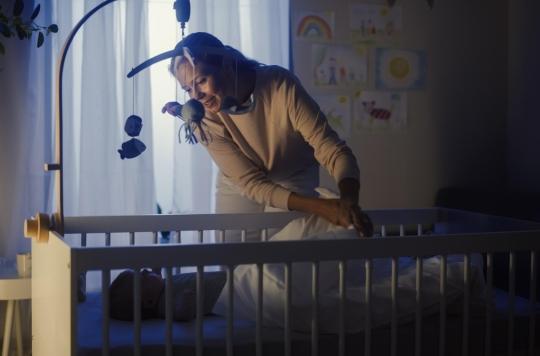Mothers are more concerned by the mental load related to a child’s sleep, according to an Ifop study. An unequal distribution of tasks which causes a greater number of disputes within a couple.

- About 44% of women said they slept less well since becoming mothers compared to 33% of men.
- According to the Ifop study, 44% of parents have already pretended to sleep so that their spouse takes care of the waking baby.
78%. This is the proportion of mothers who get up more often at night than their spouses to go and see their children under three. A finding drawn up by a new study carried out by the Institute for Opinion and Marketing Studies in France and Internationally (Ifop) for the Sleepyz.fr website. For this research, 1,001 parents were questioned about the sharing of tasks from bedtime to waking up for their children under 3 years old.
An unequal distribution of tasks between mothers and fathers
Among the habits observed, it is specified that 2/3 of the parents have introduced a rotation for nocturnal awakenings, but only 25% of the women consider that this organization is balanced. As the study shows, mothers are more likely to get up at night to see a sick child or comfort him after a nightmare. Females are also more likely to quickly check on their young when they are crying during the night. They take about 4.5 minutes to get up compared to 8 minutes for men.
The accumulation of fatigue from the restless nights of an infant or young child can lead a couple to argue more frequently. For 66% of parents, the management of the child’s sleep was also a source of recurring disputes. As for the phases preparing for bedtime, they are mostly managed by mothers (85%). They check the cleanliness of the diaper or take the toddler to the toilet before putting him to bed in order to avoid incidents.
A greater mental load in mothers
Another point raised in the study: more than 58% of parents admitted to having slept without the presence of their children. This situation can, for example, arise when a child is dropped off at his grandparents for a holiday or a weekend. But fathers are more likely not to sleep under the same roof as their children. To explain this, various reasons were mentioned by the respondents: professional and family obligations as well as a need to recover from the lack of sleep.
“This study shows that not only do mothers get up much more often than their partner, but also that they bear more of the mental load associated with preparing their young children for sleep. Within this mental load, the inequalities distribution widen depending on their nature: they are less important when it comes to changing the diaper or reading a story than when dealing with an emergency, an unforeseen situation. the woman who intervenes, as indicated in particular by the twice faster reaction time of mothers when they hear their child crying at night.(…) Nevertheless, it seems that a form of rebellion is emerging, particularly among the women who call themselves feminists, even very feminists, who do not hesitate to reproach their spouses for their lack of involvement”, indicated Louise Jussian, in charge of studies at the Gender, Sexualities and Sexual Health pole at Ifop.
However, a positive development was underlined in the survey: equity is better respected among the youngest parents, according to 48% of fathers and 40% of mothers aged 18 to 24.

















